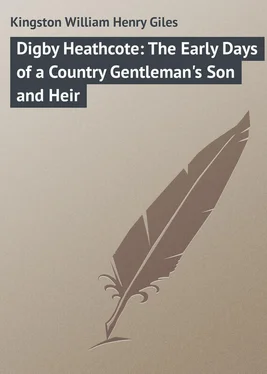William Kingston - Digby Heathcote - The Early Days of a Country Gentleman's Son and Heir
Здесь есть возможность читать онлайн «William Kingston - Digby Heathcote - The Early Days of a Country Gentleman's Son and Heir» — ознакомительный отрывок электронной книги совершенно бесплатно, а после прочтения отрывка купить полную версию. В некоторых случаях можно слушать аудио, скачать через торрент в формате fb2 и присутствует краткое содержание. Издательство: Иностранный паблик, Жанр: foreign_prose, foreign_children, на английском языке. Описание произведения, (предисловие) а так же отзывы посетителей доступны на портале библиотеки ЛибКат.
- Название:Digby Heathcote: The Early Days of a Country Gentleman's Son and Heir
- Автор:
- Издательство:Иностранный паблик
- Жанр:
- Год:неизвестен
- ISBN:нет данных
- Рейтинг книги:5 / 5. Голосов: 1
-
Избранное:Добавить в избранное
- Отзывы:
-
Ваша оценка:
- 100
- 1
- 2
- 3
- 4
- 5
Digby Heathcote: The Early Days of a Country Gentleman's Son and Heir: краткое содержание, описание и аннотация
Предлагаем к чтению аннотацию, описание, краткое содержание или предисловие (зависит от того, что написал сам автор книги «Digby Heathcote: The Early Days of a Country Gentleman's Son and Heir»). Если вы не нашли необходимую информацию о книге — напишите в комментариях, мы постараемся отыскать её.
Digby Heathcote: The Early Days of a Country Gentleman's Son and Heir — читать онлайн ознакомительный отрывок
Ниже представлен текст книги, разбитый по страницам. Система сохранения места последней прочитанной страницы, позволяет с удобством читать онлайн бесплатно книгу «Digby Heathcote: The Early Days of a Country Gentleman's Son and Heir», без необходимости каждый раз заново искать на чём Вы остановились. Поставьте закладку, и сможете в любой момент перейти на страницу, на которой закончили чтение.
Интервал:
Закладка:
W.H.G. Kingston
Digby Heathcote: The Early Days of a Country Gentleman's Son and Heir
Chapter One
“I’ll not stand it, that I won’t, Master Digby. To think that you, a young gentleman who has plenty to eat and drink of everything that’s nice, and more than enough, too, should come and put your fingers through the paper into my jam pots, which I’ve just been and nicely tied down, and all for mischief’s sake, it’s not to be borne, let me tell you. You’ve been and eaten up a whole pot of raspberry jam, and better than half a one of greengage. I wonder you are not sick with it. If you ever do it again, I’ll leave your honoured father’s service sooner than submit to such behaviour, that I will – remember, Master Digby.”
These exclamations were uttered by Mrs Carter, the housekeeper at Bloxholme Hall, the residence of Mr Heathcote, the representative of one of the oldest families in the county.
The culprit thus addressed, who had been caught in flagrante delicto , stood before her with very sticky fingers, his countenance, however, wearing anything but an expression of penitence.
“I like jam, and you don’t give me enough in my puddings,” was the only excuse he deigned to offer for his conduct.
“You’ll go without it altogether, Master Digby, let me tell you,” retorted Mrs Carter. She was the only person in the establishment who ventured to thwart the young gentleman, though he did not love the old lady the worse for that.
Digby was Mr Heathcote’s eldest son and heir. He had just attained the mature age of nine years, and had hitherto in many respects been considerably spoilt. Mr Heathcote had not succeeded to his property till rather late in life, and he had not till then married. A son had long been wished-for, and when one was given, the grateful hearts of the parents felt that they could not prize him too much. Too thankful they might not have been, but they petted and indulged him more than was for his good. He had also three elder sisters. They, in their fondness, did their best to spoil him; indeed, as Mrs Carter used to observe to Alesbury, the butler, she was afraid Master Digby would soon become as much of a pickle as any she had in her store-room. He was a sturdy little fellow, with fat, rosy cheeks, and a figure which already gave promise of considerable muscular powers. Alesbury was wont to remark that it was quite a pity Master Digby had not been born a younger instead of an elder son, he seemed so well able to fight his way in the world. He had a fair complexion – already a little tanned, by the by – light brown curling hair with a tinge of gold in it, he had good-sized honest eyes, and looked as he was – from head to foot a thorough English boy. He had been spoilt hitherto, certainly, but not altogether so. He had been taught by both his parents to worship and fear God, and to hate and abhor a lie. He had only once been known to tell an untruth, and then Mr Heathcote did what very nearly broke his heart to do; he flogged him severely, and shut him up, and would not speak to him for the remainder of the day. Digby did not care much about the pain of the flogging, but he felt the disgrace keenly, and it impressed on his mind the enormity of the crime of which he had been guilty. I believe that he never after that event uttered a falsehood. His very varied tricks and numerous eccentric pranks were therefore constantly being brought to light, when less honest boys might have managed to escape detection for those they had committed; but few could find it in their hearts to punish the young heir of Bloxholme when he ingenuously confessed his fault, and expressed himself, as he really felt at the time, sorry for what he had done.
“Oh, Master Digby! Master Digby! what would your mamma say if she saw you now?” continued Mrs Carter.
“I like jam,” repeated Master Digby; an assertion of the truth of which he had given strong evidence.
“Are you not ashamed of yourself?” added Mrs Carter, not taking notice of his reply.
“The jam isn’t yours, Mrs Carter,” exclaimed Digby, as if a bright idea had struck him.
“It is given into my charge by my mistress, Master Digby, and I am answerable for every pot of it,” answered the housekeeper, in a serious tone, in which sorrow and rebuke were blended.
Digby was silent for a moment, and then seemed to see the matter in a new light.
“I’m sorry for taking the jam, Mrs Carter; I’ll tell mamma what I’ve done, and then she won’t be angry with you, I know,” he replied, looking very penitent.
“There’s a darling, now,” exclaimed Mrs Carter, catching him up in her arms, and giving him a kiss; whereby, in consequence of his struggles to get free, for he had a great dislike to such marks of affection, her black silk dress was very considerably daubed with the jam yet adhering to the young gentleman’s fingers. “Oh, Master Digby, Master Digby, what have you done!” cried the old lady, when she discovered the injury which her demonstration of affection had brought upon her dress. “Oh, it never will look nice again.”
“I am so sorry, Mrs Carter, indeed I am,” said the boy, eyeing the dark marks his fingers had left. “The first money I get I will buy you a new gown, that I will; I won’t take your jam any more, that I won’t.”
After this promise, Mrs Carter knew that her jam was safe, and she willingly bore the injury done her dress for such a result. She would have given Digby another hug, but she took the precaution of washing his hands before attempting such a proceeding.
“There now, Master Digby, I dare say the dress won’t be much the worse, after all,” she remarked, as soon as she had dried his hands. “You’re a dear, good child, that you are.”
Digby knew what was coming, and watching his opportunity, he bolted out of the room. Snatching up his cap, away he ran, shouting, through the gardens and woods which surrounded the old hall, in very exuberance of spirits, without any definite idea as to where he was going or what he should do with himself. Similar to this had hitherto been most of Digby’s misdemeanours and scrapes, and thus, as he had not learned to estimate the evil consequences of his naughtinesses, he was not deterred, when the temptation came in his way, of committing fresh ones.
One of Digby’s sisters was but a year older than himself, and very naturally was his constant companion. Kate, that was her name, was a very quick, intelligent girl, the cleverest of the family, but her talents were like wild plants, which bear flowers very beautiful to look at, but if allowed to grow without training, apt, from their very exuberance, to do mischief. Kate could write poetry, and very funny poetry it was too. Digby admired it amazingly. At all events it was rhyme, and the lines were of the same length and not inharmonious. Nobody could read it without laughing at the quaint ideas and, curious expressions. The handwriting was curious – I wish that I could give an idea of it. The letters were very round and irregular, capitals and small letters were oddly mingled, and the lines wandered up and down the pages. The orthography, too, was not of the most orthodox description. Her little inaccuracies in that respect, however, Digby himself was not likely to discover. Kate could draw, too, and indulged largely in caricaturing the eccentricities of any of her friends and acquaintance. If her poetry was funny, the designs she produced with her pencil were still more so. They never failed to produce roars of laughter from Digby, who, if not witty or talented himself, was fully able to appreciate her wit and talent.
Both her poetical effusions and her caricatures had hitherto been devoted exclusively to Digby’s amusement, and no other member of their family was aware of her powers in that direction.
Читать дальшеИнтервал:
Закладка:
Похожие книги на «Digby Heathcote: The Early Days of a Country Gentleman's Son and Heir»
Представляем Вашему вниманию похожие книги на «Digby Heathcote: The Early Days of a Country Gentleman's Son and Heir» списком для выбора. Мы отобрали схожую по названию и смыслу литературу в надежде предоставить читателям больше вариантов отыскать новые, интересные, ещё непрочитанные произведения.
Обсуждение, отзывы о книге «Digby Heathcote: The Early Days of a Country Gentleman's Son and Heir» и просто собственные мнения читателей. Оставьте ваши комментарии, напишите, что Вы думаете о произведении, его смысле или главных героях. Укажите что конкретно понравилось, а что нет, и почему Вы так считаете.












